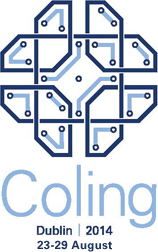"When students travel they don't carry grammar books, they carry dictionaries."
(Krashen in British Council Conference, Milan, 1987)
"without grammar very little can be conveyed,
without vocabulary, nothing can be conveyed."
Wilkins, D. (1972) Linguistics in Language Teaching. Edward Arnold.
"I can't guarantee that if you know
all the words you will be able to speak Chinese,
but I can guarantee that if you don't know the words you won't be able to." (unknown source)
CogALex stands for Cognitive Aspects of the Lexicon. It is a SIGLEX-endorsed, co-located workshop of COLING, the 25th International Conference on Computational Linguistics. COLING is organized by the Center for Global Intelligent Content (CGNL), taking place at the Helix Conference Center at Dublin City University (DCU) in Dublin, Ireland (from 23 - 29 August).
Starting with the Workshop on Enhancing and Using Electronic Dictionaries at COLING 2004 in Geneva, there have been the three follow-up workshops of the COGALEX series, each co-located with COLING (2008 : Manchester, 2010 : Beijing, 2012 : Mumbai). Encouraged by the enthusiasm and interest expressed by the participants of the first three COGALEX events, we propose another edition of the workshop. As with the preceding events our aim is to provide a forum for computational lexicographers, researchers in NLP, psychologists and users of lexical resources to share their knowledge and needs concerning the construction, organisation and use of a lexicon by people (lexical access) and machines (NLP, IR, data-mining). Like in the past, we will invite researchers to address various unsolved problems (see below), but this time we will add two features: one is devoted to a shared task (click here) where the system is meant to learn automatically how to find a word on the basis of its definition or associated terms, the other feature is ‘vocabulary learning’.
Vocabulary learning is understandably not a hot topic in computational linguistic, yet it is an important aspect of language learning, both in the mother tongue and in a foreign language. While having a rich stock of vocabulary is an asset, knowing the basic words and expressions is a must. Yet, naturally people tend to forget some of the words they (thought to) have learned. This is not just a question of exercice (quantity vs. quality). Traditional word lists or flash cards are clearly not the ultimate answer. They are not only boring, but also rarely very effective. There is so much more we could do these days by using corpora and computational linguistic know-how, to extract the to-be learned words from text and display them with their context. Hence, rather than having the user repeat single words (or word pairs) we could display them in various contexts (e.g. sentences), thereby making sure that the chosen ones correspond to the learners’ level and interests.
Workshop Chairs
Michael Zock
CNRS-LIF, Marseille (France). [Homepage]
Reinhard Rapp
LIF-AMU, Marseille (France) and University of Mainz (Germany). [Homepage]
Chu-Ren Huang
Polytechnic University (Hong Kong). [Homepage]
WHAT'S NEW


